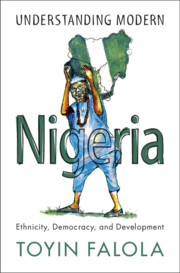Book contents
- Understanding Modern Nigeria
- Understanding Modern Nigeria
- Copyright page
- Dedication
- Contents
- Figures
- Maps
- Preface
- Acknowledgments
- Part I Introduction
- Part II Context and History
- Part III Democracy and Governance
- Part IV Development Crises
- Part V Reforms and Revolutions
- Part VI Conclusion
- Conclusion: Pathways to the Future
- Bibliography
- Index
Conclusion: Pathways to the Future
from Part VI - Conclusion
Published online by Cambridge University Press: 09 June 2021
- Understanding Modern Nigeria
- Understanding Modern Nigeria
- Copyright page
- Dedication
- Contents
- Figures
- Maps
- Preface
- Acknowledgments
- Part I Introduction
- Part II Context and History
- Part III Democracy and Governance
- Part IV Development Crises
- Part V Reforms and Revolutions
- Part VI Conclusion
- Conclusion: Pathways to the Future
- Bibliography
- Index
Summary
“Pathways to the Future” renders a conclusion to Understanding Modern Nigeria by providing solutions to the identified challenges of Nigeria’s development, democracy, and modernity. Despite increasing ethnic differences, Nigerians have collaborated to overcome shared challenges and emerge with impressive results. These narratives of unity continue to be downplayed while narratives of the nation’s unstable foundations, vices, and challenges are exalted and exploited by members of the country’s political class for divisive and destructive goals. This discourse identifies the following as challenges hindering the development of the nation: lack of progressive political ideas, absence of true federalism, bad educational system, increase in poverty and unemployment, ethno-religious intolerance, lack of effective economic policies, etc. But identifying the challenges is not as difficult as providing the solutions or implementing them. Hence, necessary steps to actualize a desirable future are presented, which are arguments not offered as an exhaustive list, but rather fundamental approaches to achieve common goals for national development that should guide the conduct of a multi-ethnic, multi-religious, and multicultural community like Nigeria.
- Type
- Chapter
- Information
- Understanding Modern NigeriaEthnicity, Democracy, and Development, pp. 603 - 624Publisher: Cambridge University PressPrint publication year: 2021

